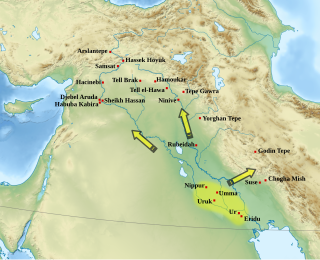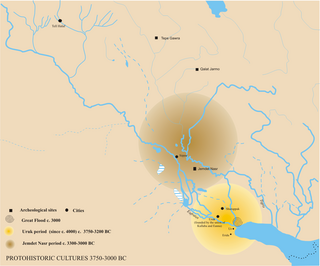Uruk was a city in ancient Sumer.
Uruk may also refer to:

A Linux distribution is an operating system made from a software collection that includes the Linux kernel, and often a package management system. Linux users usually obtain their operating system by downloading one of the Linux distributions, which are available for a wide variety of systems ranging from embedded devices and personal computers to powerful supercomputers.
Uruk, today known as Warka, was a city in the ancient Near East situated east of the present bed of the Euphrates River on the dried-up ancient channel of the Euphrates. The site lies 93 kilometers northwest of ancient Ur, 108 kilometers southeast of ancient Nippur and 24 kilometers southeast of ancient Larsa. It is 30 km (19 mi) east of modern Samawah, Al-Muthannā, Iraq.
Distro may refer to:
Sorcerer may refer to:
urpmi is a package management tool for installing, removing, updating and querying software packages of local or remote (networked) media. It wraps around the RPM Package Manager in the role of a smart package manager. It uses repositories and will resolve dependencies so that the user will not suffer from dependency hell that can happen when using RPM directly. It works with official sources from Mandriva or unofficial sources such as those from the Penguin Liberation Front. It has a graphical front-end: Rpmdrake.

Within the free software and the open-source software communities there is controversy over whether to refer to computer operating systems that use a combination of GNU software and the Linux kernel as "GNU/Linux" or "Linux" systems.
Mint or The Mint may refer to:

Scientific Linux (SL) is a discontinued Linux distribution produced by Fermilab, CERN, DESY and by ETH Zurich. It is a free and open-source operating system based on Red Hat Enterprise Linux.

The Uruk period existed from the protohistoric Chalcolithic to Early Bronze Age period in the history of Mesopotamia, after the Ubaid period and before the Jemdet Nasr period. Named after the Sumerian city of Uruk, this period saw the emergence of urban life in Mesopotamia and the Sumerian civilization. The late Uruk period saw the gradual emergence of the cuneiform script and corresponds to the Early Bronze Age; it has also been described as the "Protoliterate period".
Distribution may refer to:
Linux is a family of computer operating systems based on the Linux kernel.
Gentoo may refer to:

Linux is a family of open-source Unix-like operating systems based on the Linux kernel, an operating system kernel first released on September 17, 1991, by Linus Torvalds. Linux is typically packaged as a Linux distribution, which includes the kernel and supporting system software and libraries, many of which are provided by the GNU Project. Many Linux distributions use the word "Linux" in their name, but the Free Software Foundation uses the name "GNU/Linux" to emphasize the use and importance of GNU software in many distributions, causing some controversy.
Flavor or flavour is either the sensory perception of taste or smell, or a flavoring in food that produces such perception.
Kushim may refer to:
Naram-Suen (Naram-Sin) may refer to any of four kings in the history of Mesopotamia:

The Jemdet Nasr Period is an archaeological culture in southern Mesopotamia. It is generally dated from 3100 to 2900 BC. It is named after the type site Tell Jemdet Nasr, where the assemblage typical for this period was first recognized. Its geographical distribution is limited to south-central Iraq. The culture of the proto-historical Jemdet Nasr period is a local development out of the preceding Uruk period and continues into the Early Dynastic I period.

Linux-libre is a modified version of the Linux kernel that contains no binary blobs, obfuscated code, or code released under proprietary licenses. In the Linux kernel, they are mostly used for proprietary firmware images. While generally redistributable, binary blobs do not give the user the freedom to audit, modify, or, consequently, redistribute their modified versions. The GNU Project keeps Linux-libre in synchronization with the mainline Linux kernel.
Lede may refer to:

Uruk GNU/Linux-libre is a PureOS-based Linux distribution. The name Uruk is an Iraqi city that states its Iraqi origin. Uruk GNU/Linux 1.0 was released on 13 April 2016 and it ships with the most common software for popular tasks.